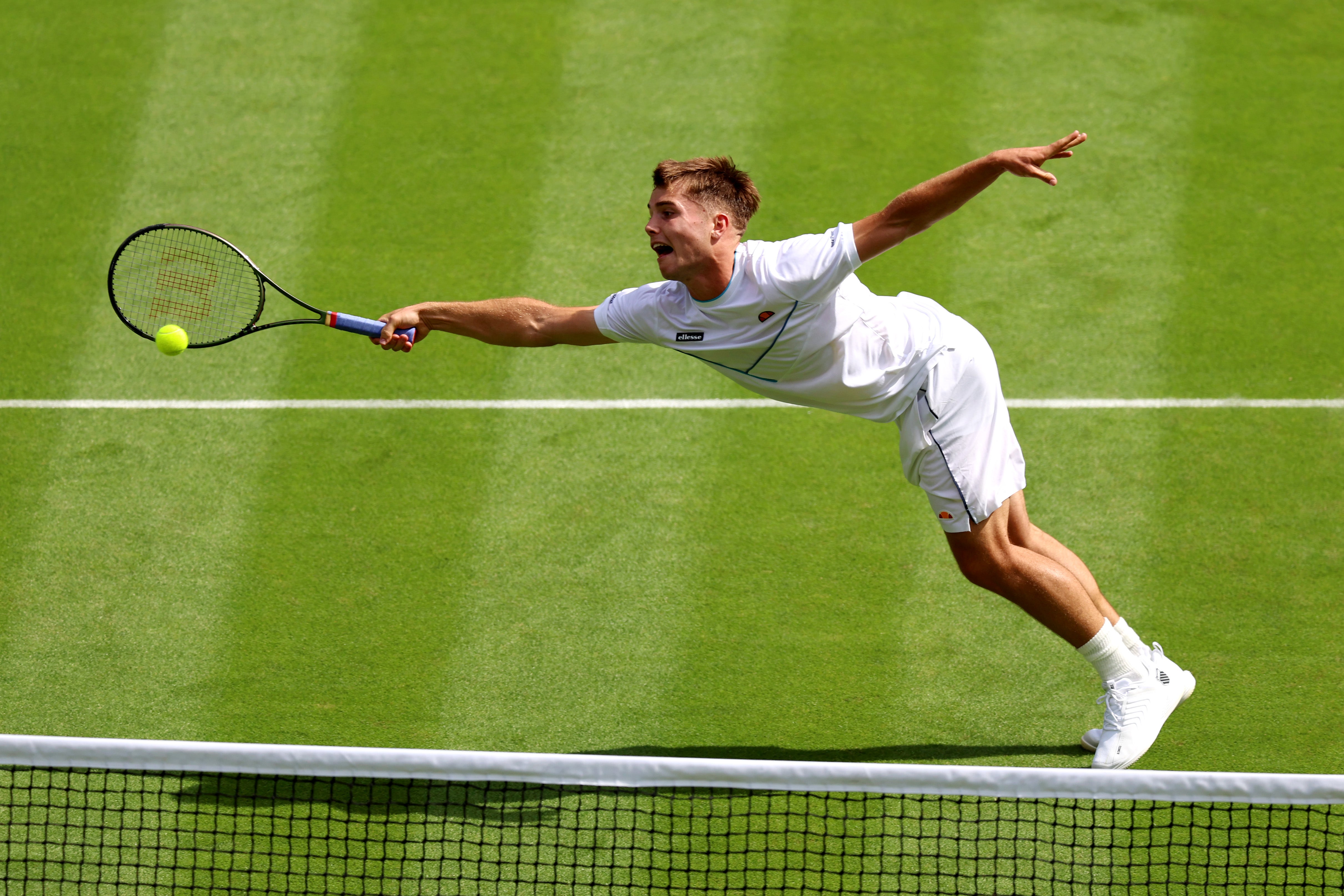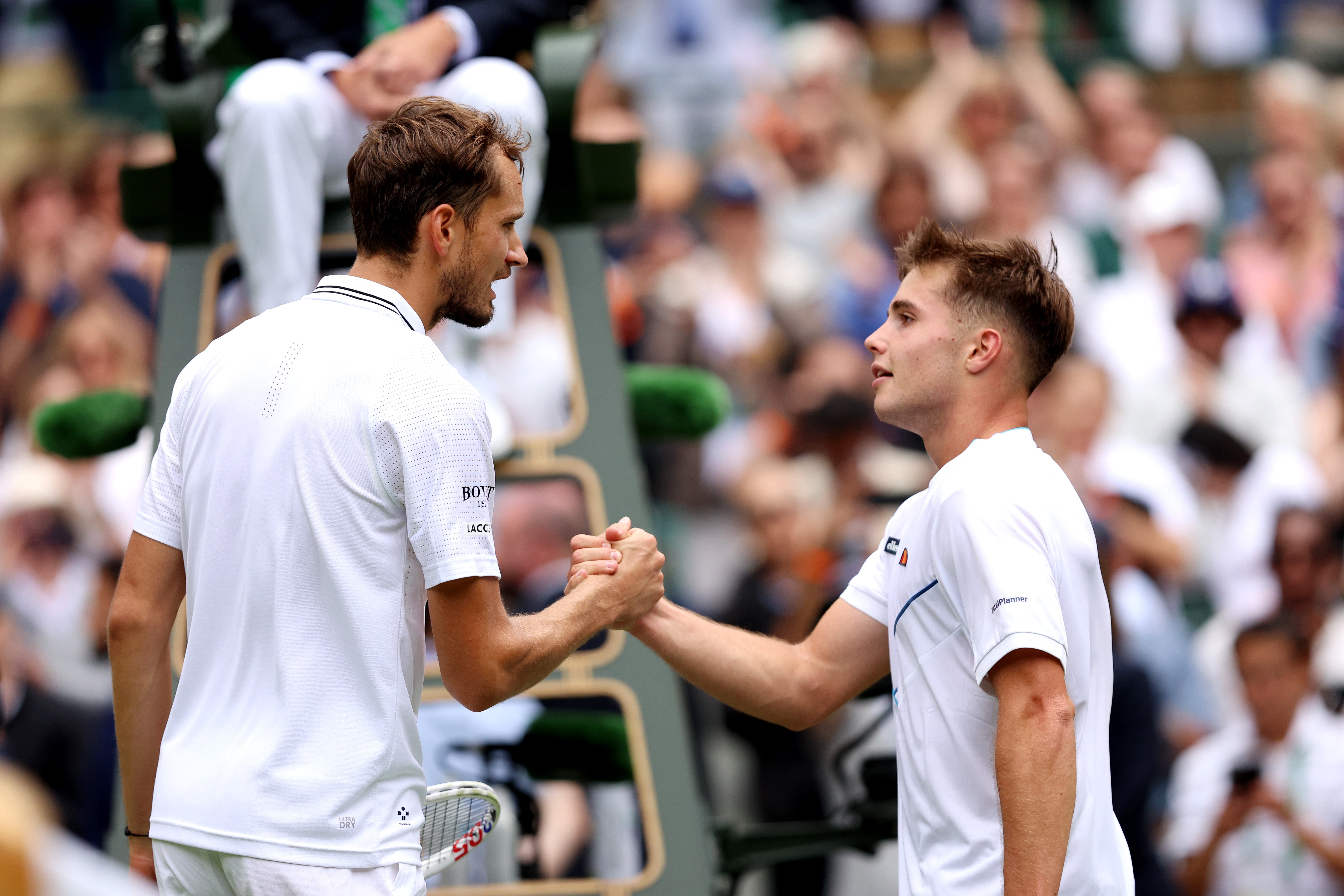Long live the wildcard: Arthur Fery produces a Wimbledon moment even in defeat
The 20-year-old Briton was beaten by Daniil Medvedev in straight sets, but the crowd lived and loved every second of Fery’s valiant showing

Your support helps us to tell the story
From reproductive rights to climate change to Big Tech, The Independent is on the ground when the story is developing. Whether it's investigating the financials of Elon Musk's pro-Trump PAC or producing our latest documentary, 'The A Word', which shines a light on the American women fighting for reproductive rights, we know how important it is to parse out the facts from the messaging.
At such a critical moment in US history, we need reporters on the ground. Your donation allows us to keep sending journalists to speak to both sides of the story.
The Independent is trusted by Americans across the entire political spectrum. And unlike many other quality news outlets, we choose not to lock Americans out of our reporting and analysis with paywalls. We believe quality journalism should be available to everyone, paid for by those who can afford it.
Your support makes all the difference.Perhaps when he is old and grey, Arthur Fery will still remember the sound – the sincerity in the cheers, the warmth in the applause as the crowd welcomed him to Wimbledon. There he was: the world No 391 with a boyish face on a man’s frame, his bag a flash of red against the pristine green turf as he led out the world No 3, Daniil Medvedev, for the toughest of opening tasks at the grass-court slam.
“Definitely haven’t had that before,” the 20-year-old Briton would reflect later in the day. “Walking out to a packed Court 1, that was super special. I definitely couldn’t really get ready for that, no matter what I did before.”
It didn’t take long for the first of many, many, “Come on, Arthur!”s to echo down from the stands (thankfully there were no ironic “Come on, Tim!”s), that initial call acknowledged by Fery with a vigorous nod of the head, before whistles rung around the arena. There was even a charm in the youthful exuberance with which he skipped to the baseline, after standing face to face with Medvedev for the toin coss, where the Russian towered over the wildcard.
But for all the crowd’s support, and for all its belief that such support would be needed, Fery seemed determined to prove that if he was to pull off the most significant of upsets here, he would be able to do it alone. All the evidence one could need was visible in the first game; it was in the composure that Fery showed to win a brief opening rally, in the confidence of the booming ace that followed, and in the volleys that sealed a hold to love – one imaginative and deft, the other sharp and emphatic.
“Yeah, played a good first game,” Fery said later, nonchalantly. “I was pretty set on how I wanted to play. In those moments, you’ve just got to try to stick to a game style, have a really clear mindset of what you’re going to do. Even though nerves probably were a little high, I managed to play a really good first two games, which kind of settled me down. You get used to the whole atmosphere, looking around. Slowly you just get used to it.”
Even if, in glimpses, Fery had already shown an ability to get along by himself, the crowd was desperate to be involved. Although the second game did not herald the break that fans hoped for, an almost ludicrous roar erupted on No 1 Court when Fery simply reached deuce.

Maybe it is his nature, or maybe it was a specific determination to stay focused on the task of hand; either way, Fery rarely engaged with the crowd. There was barely a fist pump, barely a glance into the stands. Still, those in close proximity at All England Club showered their man – their boy – in adoration and encouragement. It did not cease when Medvedev scored what would have been a devastating early break, nor did Fery’s commitment to bold tennis – a scorching passing shot here, a pillowy volley there. And when Fery broke back at once, and when he went on to hold for a 4-3 lead, the crowd celebrated as if he had moved to within a game of the Gentlemen’s Singles title.
Over on Centre Court, Jodie Burrage’s second-round tie with 11th seed Daria Kasatkina was proof of how differently these kinds of clashes can go. While Fery was entering a decisive juncture in the first set, Burrage was standing from her court-side chair and plodding back to the baseline, hoping to leave her 0-6 opening set behind her. In winning two games, she did that to a degree, but her defeat was written swiftly. Yet Burrage, 24, had already had her Wimbledon moment when she won her first-round match in straight sets – a rapid vindication of her wildcard status.
And back on No 1 Court, Fery continued to vindicate his.
That was in spite of an ill-timed rain delay disrupting the 20-year-old’s momentum, and Medvedev snatching the opener 7-5. “We love you, Arthur,” a woman shouted from one of the back rows, sounding like a proud mother appealing to a sad son. On court, there was a little sulking from Fery – a ball pinged into the air, another slapped onto the turf and bouncing out of view.

But still the wildcard – increasingly embodying the spirit of the word – set about trying to level the score. A break point went begging, to the dismay of most but the delight of one fan, who had clearly been longing to cry: “Come on, king Arthur!”
The man who would be king for a day was faltering, but the crowd was not. Medvedev secured a break of serve and extended his second-set lead with a comfortable service game, then as Fery paused before taking his next serve, it seemed that – finally – he had recognised the part that the crowd could play in helping him.
Maybe it was too late. Medvedev took the set 6-4. The third set also slipped away from Fery, and with it the match, but those in attendance might argue that the moment had not.
And Wimbledon, so often, is about moments and memories – not just results. That is a reality that will ring truer to Fery with each year ahead, though he may yet be back more than once in that time. “I think I played well and handled my nerves well,” he said. “I feel like it could be a pretty standard thing in the coming years, to play in these tournaments on the big courts. It was obviously an unbelievable experience, the crowd was great. I enjoyed every moment out there.”
So, perhaps when he is old and grey, Arthur Fery will still remember the sound – the sound that greets a wildcard walking out at Wimbledon.



Join our commenting forum
Join thought-provoking conversations, follow other Independent readers and see their replies
Comments